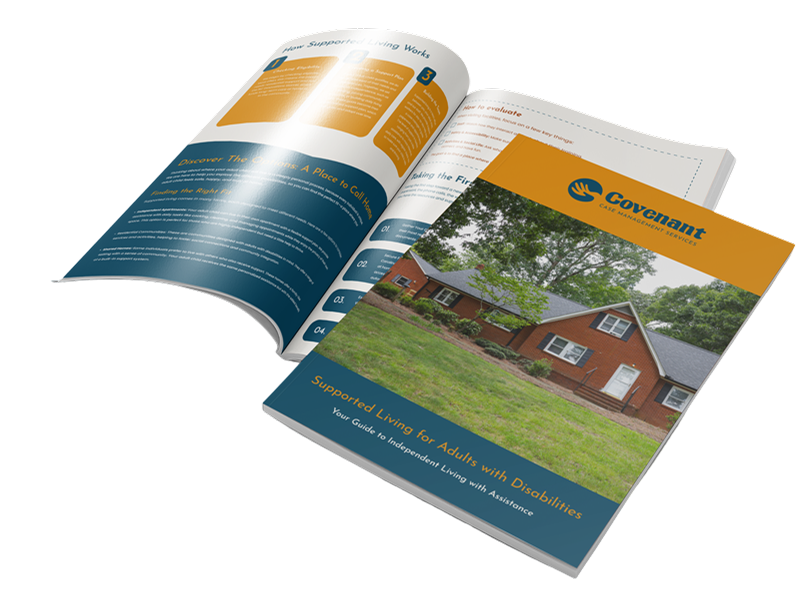
Finding The Best Residential Care for Disabled Adults
Covenant Team
Oct 16, 2025
Get the Guidance You Deserve, Right to Your Inbox
Whether you’re a caregiver, care professional, or individual seeking independence, We aim to keep you informed and inspired. Receive updates on services, events, and stories of hope by signing up to become a part of our email list below.
The shift to adulthood for a child with intellectual and developmental disabilities is a crossroads moment. You’ve always been their greatest advocate, but now a new, mature chapter is beginning. It’s a time to advocate for their future, and help them find their place in the world and build a life of their own.
Residential care provides a supportive and supervised living arrangement for adults with disabilities outside of their family home. It provides a community where your adult child can live with purpose and dignity. These programs are designed to offer assistance with daily living, opportunities for social engagement, and a safe environment where they can continue to develop new skills and build greater independence.
We understand this can feel like a major transition, so we’re here to help you explore your options and find the perfect fit for your family.

The Options: Types of Residential Care
Exploring long-term residential care is a way to create a supportive and structured environment where your adult child can thrive. It’s a path toward helping them build new skills, find a sense of belonging, and feel more independent in their daily life.
The following three options offer different ways to fit your adult child’s unique needs.
Community-Based Residential Programs
These programs, often called group homes, offer a real home-like setting within a neighborhood. They are smaller environments where residents live together with dedicated care staff, fostering a sense of family and community.
These homes encourage your adult child to be an active part of the community, whether through daily activities, social events, or supported employment. It’s a great option for promoting social integration and a more typical, independent lifestyle.
Supported Living Services
Supported living is all about providing just the right amount of help so your adult child can live in their own space. This can mean having a place of their own or sharing a home with a roommate, all while receiving personal care assistance with daily living support for disabled adults.
The support is customized to them, focusing on building skills like cooking, managing money, and understanding their community. This model is perfect for those who are ready for more independence but still benefit from supervision and support from trained care staff.
Skilled Nursing and Care Homes
For individuals with more complex medical needs, a skilled nursing or specialized care home is the best option. These residential facilities for special needs provide round-the-clock medical care and supervision in a safe, structured environment.
While the focus is on a high level of care, these homes still strive to create a warm and engaging atmosphere. They ensure your adult child receives the support needed to live comfortably and securely, with all their health requirements met.
What to Look for in Residential Care
When you start to explore residential care, you will see that high-quality options provide a foundation of support, kindness, and purpose, so your adult child can grow, belong, and be celebrated. We encourage you to trust your instincts and remember that you are your adult child’s greatest champion. Do not quit your search until you find a setting that feels like a genuine home, one that meets their needs and celebrates their unique spirit. Consider the following as you make your decision:
- Individualized support: The best care is never a one-size-fits-all approach. High-quality long-term residential care should be tailored to your adult child’s specific needs, focusing on their physical, emotional, and social well-being. A great program starts by understanding who they are and what they need to thrive.
The type of disability your adult child will guide you to the most appropriate care. For a learning disability, a community-based setting may offer the right balance of support and independence. If your adult child has more complex medical needs, a specialized home with constant supervision might be the safest and most supportive option. For example, some programs provide specific services like speech, occupational, or physical therapy, which are built right into their daily routine.
- Quality of Care: A recent review on individualized housing shows that specialized group homes provide superior outcomes in terms of service quality and residents’ experiences compared to other care models. As you visit different places, pay attention to the small details such as how staff interact with residents, the cleanliness of the space, and the overall atmosphere.
- Autonomy: Moving to a residential program is a huge step toward independence, and we believe every person should have a voice in their future. Consider a residential option that focuses on encouraging residents to set goals and make their own decisions about their daily lives. This could be as simple as choosing what to eat for dinner or as meaningful as learning to manage their personal schedule.
- Social Participation: Life is meant to be shared. A good residential setting helps your adult child connect with the community and provides opportunities for social engagement and friendship. This could mean a community-based residential program like the Dream Center that provides enriching activities and organizes group outings.
- Family Involvement: You and your family will always be a central part of your adult child’s life. When exploring different options, consider how the program supports family involvement. Ask about visitation policies, communication with staff, and how they help families through this transition. A supportive team will welcome your continued presence and partnership.
How Covenant Walks With You
Transitioning to residential care is a big step, not including the paperwork and applications for programs like the Innovations Waiver or SSI and Medicaid in North Carolina. We can help you find a community that not only supports your adult child but also helps them live a full and meaningful life. Together, we can find the right residential care for your adult child to support their long-term well-being.
Download Your FREE Supported Living Guide!


